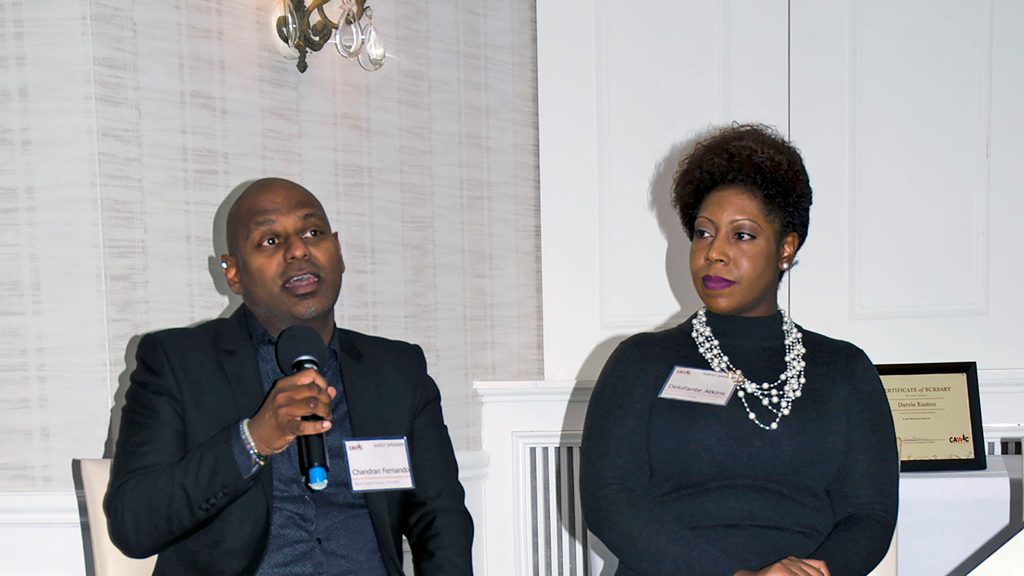The key to diversity and inclusion in the workplace is starting a conversation.
Chandran Fernando, founder and principal of Matrix Search Group, a recruitment source for the real estate and property management industries, and Delofante Atkins, manager of talent and inclusion at Matrix, were panellists during a discussion billed as Women in Construction Industry Relations at the Canadian Association of Women in Construction’s (CAWIC) holiday event held Jan. 9 at the Estates of Sunnybrook in Toronto.
“Everything starts with that one thing that’s called your voice,” explained Fernando.
“It’s picking up the phone, meeting with the leaders of corporate real estate and saying can we talk, can we speak to this idea of diversity and how it actually plays in the corporate world with talent management, retention and succession planning.”
Atkins added having the conversation around diversity and inclusivity can sometimes be difficult.
“Find the courage to say what nobody feels comfortable saying but needs to be said,” she told members of the audience.
“When I walk into a room and out of a roundtable of 15 seats there are only two people that look like me, in 2018 that’s not acceptable anymore. If we all sit there and don’t say anything about it then how do we expect in 2019 that there is going to be any change? Start that conversation, be prepared to be uncomfortable while having that conversation, go deep within that conversation because only from there will we get that change that will be beneficial to all of us.”
While initiating the conversation is a good start, there also needs to be an action plan in place.
“You need to have some purposeful initiatives that will ensure that we are represented a lot better,” said Atkins.
“We need to be invested to make sure that whatever is being implemented works.”
She added women need to stand up for themselves and support each other.
“If you notice that there are any policies or a lack of policies within your organization that support your access to growth development, to being on the track for leadership, voice those concerns, talk to investment stakeholders to ensure that your voice is heard,” said Atkins.
In 2016, Matrix conducted the Canadian Real Estate and Workplace Diversity Survey.
The results show the industry in Canada is highly skewed with regards to diversity.
Fernando explained all sections of real estate were surveyed across Canada — public, private and institutions.
“Informally we were aware of all the numbers out there, but this survey was an instigator to get senior executive leaders to actually pay attention to and say there is a problem with our demographics at the senior leadership level,” said Fernando.
Once the results were released executives began to ask how to retain a diverse workforce.
“First of all, you have to make sure your policies are welcoming to these individuals. You have to be 100 per cent committed. You have to start investing in your people, because when you start investing in diverse groups, your innovation goes up,” he said.
“If your innovation goes up, your business case goes and you make more money.
“Once you start speaking the business case and the numbers behind it, people will pay attention.”
Awareness is also an important factor, Fernando said. Executives often want to help but don’t know what to do because they are so far removed.
“It starts at your kitchen table. It starts with your own groups,” he said.
“What we need to do is create a commitment to invest in proper processes that include internal mentorship programs, external mentorship programs, sponsorship programs, networking opportunities like this (CAWIC event) and educational processes. We’re then going to be able to create policies and procedures that are going to make business finally get it.”
Atkins encouraged women to take responsibility and action to shape their own careers and experiences.
“If you don’t do that, in 10 years we’re going to still be here having this conversation,” Atkins noted.
“The goal is to move past the conversation, to not just talk but to use our voices to be creative and not necessarily ask for permission. We know we have the talent, we know we have the ability.
“If nobody wants to support us, we need to support us. People will start to take notice…by that point in time you already affected the change and you’ve already paved the way as pioneers to create a more inclusive environment that we’re all very deserving of.”











Recent Comments